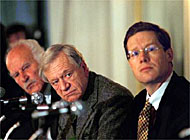Bergier Commission falls out with its general secretary

An internal row has erupted within the independent historians' commission investigating Switzerland's role in the Second World War. As a result, the group's general secretary has left the group.
Linus von Castelmur, who has served as the commission’s permanent secretary since 1996, has been asked to clear his desk with immediate effect.
Fears have been expressed that a falling-out between von Castelmur and other members of the Independent Commission of Experts (ICE), led by Jean-François Bergier, could disrupt the work of the commission ahead of the publication of a series of case studies and its final report.
Neither side in the dispute has spoken publicly about the reasons for the conflict.
Von Castelmur, a career diplomat and historian who was seconded to the ICE by the ministry of foreign affairs, has already resigned once before – in 1999 “to resume his career”. But he reconsidered following an appeal from Bergier, who assured him that his career would not be damaged if he remained on the commission.
The commission, which employed up to 60 people at the height of its research programme, was set up in 1996 to investigate the size and fate of assets moved to Switzerland before and during the Second World War by both victims and perpetrators of Nazi-era crimes. It was also mandated to investigate Swiss business relations with Nazi Germany and Switzerland’s refugee policy.
The commission’s mandate expires at the end of this year. It has already published reports on the trade in gold during the war and on Swiss refugee policy. Another 16 case studies will be published later this year, covering war-related issues such as foreign trade, capital flight into Switzerland, hidden assets, Switzerland’s financial sector, and legal reports.
A summary of the ICE’s five-years of research, unparalleled in Swiss history, will also be presented to the government at the end of the year, but will probably not be published before February 2002 due to pressure of time.
Sources close to the ICE confirmed that von Castelmur had surprised the commission on Monday by announcing his resignation with effect from August 31. Bergier is said to have regarded the decision as a breach of promise, and then effectively sacked his right-hand man with immediate effect.
However, the sources contacted by swissinfo said it was a “pretext” for von Castelmur to claim, as he apparently did, that the possible delay of a few months in publishing the commission’s proceedings had led to his decision to resign.
“The fact is he didn’t want to be associated with the commission’s hottest phase when it has to defend decisions and published material that are likely to be controversial -he felt that might tarnish his career”, a source said. Some ICE members are said to have accused von Castelmur of “desertion”.
Apart from the commission’s findings, a political conflict is looming over the future of the documents which were seized from private archives by the ICE. The commission was granted special investigative powers by an act of parliament.
According to federal law, documents of historic interest must be placed in the federal archives so they are available for future scrutiny. But private enterprises have invoked privacy rights and are demanding that documents handed to the ICE should be returned to them. They claim to have been given promises to that effect.
His critics say that von Castelmur’s appointment always carried the danger that he would be torn between his loyalties as a researcher and diplomat. They acknowledge, however, that the 44-year-old, who is an expert on Switzerland’s gold trade with Germany during the Second World War, never opposed his colleagues on the commission for ideological reasons.
Lukas Beglinger, head of the office in charge of Switzerland and the Second World War at the ministry of foreign affairs, denied fears that the disruption at the ICE could jeopardise its work during its final months.
“It’s the commission that publishes the reports, not its general secretary”, Beglinger told swissinfo. Referring to the conflict over the future of used archive material, he said that “again, it’s the cabinet that will decide on the matter, not the ICE’s general secretary.”
by Markus Haefliger

In compliance with the JTI standards
More: SWI swissinfo.ch certified by the Journalism Trust Initiative
You can find an overview of ongoing debates with our journalists here . Please join us!
If you want to start a conversation about a topic raised in this article or want to report factual errors, email us at english@swissinfo.ch.